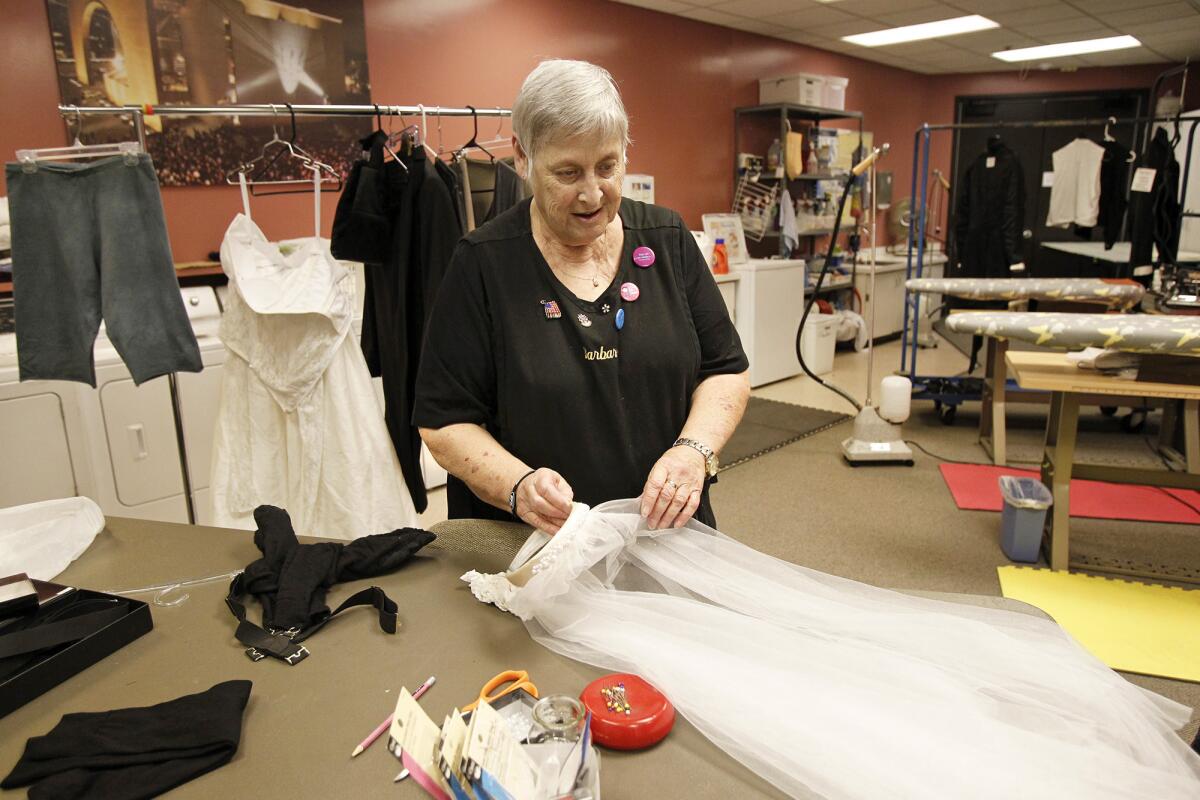Need a costume fix? This Poppa is your mama

Barbara Poppa, wardrobe supervisor at Segerstrom Center for the Arts, reached for a plastic basket and pointed to the washing machine before her.
“I’ve got exciting laundry to do,” she said, holding a ballerina’s slip for Russian dancers Osipova and Vasiliev, a ballet duo premiering that night. “And the veil for the wedding scene needs to be repaired.”
Poppa knows that as wardrobe supervisor, there’s a laundry list of primary responsibilities.
There’s the care of all costumes, shoes, undergarments, hats and costume-related props.
There’s the steaming and pressing costumes before each performance.
There’s ensuring proper labeling, hanging and storage of all costume pieces.
Then there are the costume repairs, considered “emergencies,” that are done on-site before and sometimes during the actual performance.
Stains? Holes? Rips? Odor? Poppa is armed with a sewing machine, glue gun, pins and vodka.
We’ll get to the vodka later. Let’s start at the very beginning.
Poppa, now 70, said she is not educated in theatrical production.
But sewing, yes.
She’s sewn all her life for her four kids and one grandson. And there was that time when she stitched up Kentucky Fried Chicken uniforms in her home.
It was familiarity that brought Poppa to learn of the wardrobe supervisor position at Segerstrom Center for the Arts, originally called Orange County Performing Arts Center. Poppa so badly wanted the job she wrote a letter to the head of management asking to join the team. She started in 1986, when the venue opened.
She’s been ironing costumes, checking for repairs and keeping celebrities with sizable egos in check since.
*
No whining allowed
Hidden in the lower level of the center, underneath the stage where high-profile stars have performed plays, music and dance, is Poppa’s office, papered with signage — some inspirational, others requests.
“Life’s not a dress rehearsal. Get out there and enjoy it.”
“All drama must remain on the stage.”
The word “whining” is written in bold capital letters inside a slashed circle.
“You deal with all kinds of moods,” Poppa said of the performers who step into her wardrobe shop discussing laundering and alterations. “I always say they’re little kids — you have to take care of them.”
That means tying the bows, lacing up the shoes, straightening them up and, as Poppa would say, “making them look pretty.”
“Barbara is an undiscovered treasure,” said Judy Morr, executive vice president of Segerstrom. “Her signature is that she is very calm. Barbara is solid as a rock and gives performers strength, and it’s all done very quietly.”
Morr said Osipova and Vasiliev requested that only Poppa handle their costumes because of her attention to detail. “What better endorsement?” Morr said.
With a typical day starting at 1 p.m., Poppa first reviews pages of proper garment instructions sent to her from a visiting show’s supervisor. The costumes, packed in canvas bins known as hampers, are stored in Poppa’s wardrobe office.
Some productions have loads of laundry, which prompts Poppa to start washing and drying days before the show.
After tending to the costumes, Poppa prepares for rehearsals during the sound check, where she and the actors practice the quick changes before each scene. A team of eight dressers assists Poppa on stage during a show’s run.
But there have been challenges.
Poppa once helped dress a soprano into opera gowns 17 times.
Her fastest time is dressing a ballerina in 17 seconds.
Her most stressful show? “The Will Rogers Follies.” “We had to wear gray lab coats and meet someone backstage and change character after character,” she said.
Add “Showboat” to that list. “At the end of the day, there were baskets piled with costumes just waiting to be hung,” she said. “That was defeating. I wanted to cry,” she said, laughing at the thought.
*
Have the vodka ready
There are memories.
Dame Joan Sutherland, an Australian dramatic soprano whom Luciano Pavarotti once called the “Voice of the Century,” was often found sitting in the hallways, knitting rugs.
Poppa remembers when she had to stretch opera gowns since a singer did not lose the intended 20 pounds to fit into the rented costume.
And when the center featured a production of Wagner’s Ring cycle in 2006, Poppa found herself supervising costumes for five operas, two ballets and a symphony.
“I see few of the shows because many times backstage, you can’t even hear or see behind the curtains,” she said.
Poppa said that in order to keep a cast happy, it’s up to her to put celebrities at ease in comfortable costumes.
And that comfort, she says, comes down to fabric care products.
She prefers detergent without fragrance. “Singers don’t like scents,” she said. “I hate the smell of Febreze.”
Here’s where vodka comes into play. Poppa says the best remedy to freshen up clothing is pouring the beverage into a spray bottle and using it as a deodorizer. “Wait till you see the bill for two liters,” she said.
She was quick to state her aversion to two fabric textures.
“I do not like silk costumes,” she said, annunciating each syllable. “But the worst is linen. You iron it and then the wrinkles come back.”
Poppa has her share of proud moments.
There was the time she made a suit for the Opera Pacific, a closed opera company that was once located in Orange County.
Another time, an actor from “Singin’ in the Rain” rushed off the stage and noticed the zipper on his raincoat was stuck. Poppa broke the zipper and rethreaded the jacket with pins and needles within seconds.
Recalling those moments, Poppa put her hands back into her black apron’s pockets and smiled. “I’ve never had anyone not make the show,” she said.